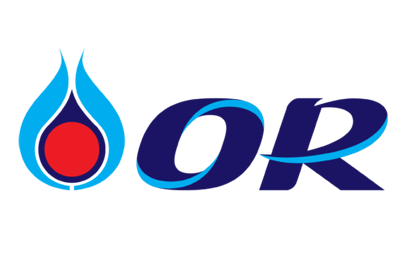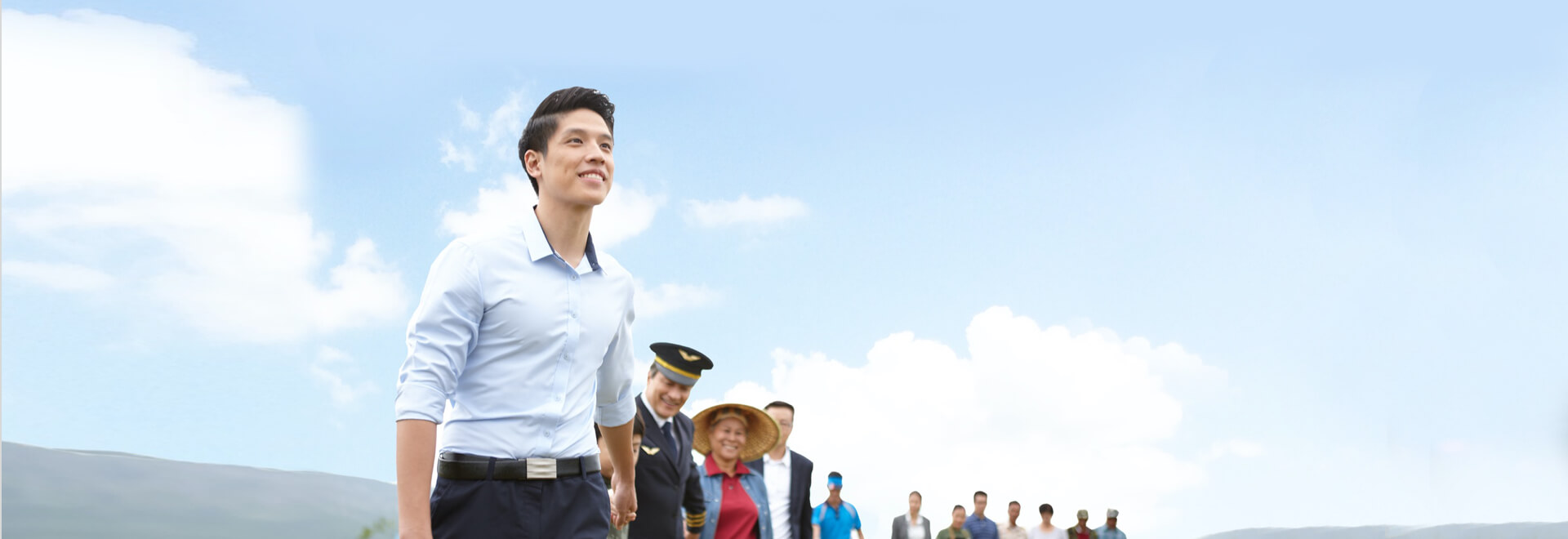
Importance
Economic expansion and the pursuit of economic growth heavily rely on the utilization of natural resources, resulting in the degradation and depletion of these resources due to rapid consumption and a lack of conservation efforts. Consequently, the concept of a Circular Economy plays a crucial role in maximizing resource utilization, enhancing efficiency, and balancing economic and social development with the sustainable management of natural resources.
OR is committed to operating its business under the concept of OR SDG (Small, Diversified, Green) by embracing the Green concept, which focuses on creating opportunities for a cleaner society and promoting green businesses for a sustainable environmental future. Under its environmental mission (Planet), OR aims to maximize resource efficiency to minimize environmental impacts. Recognizing that its operations rely on resource utilization, OR understands the need to adapt its business practices and use resources efficiently. Without such efforts, future generations may face a scarcity of natural resources. Therefore, the organization places significant importance on the Circular Economy, promoting the sustainable use of natural resources while preserving the environment. This approach aligns with the principles of the Bio-Circular-Green Economy (BCG), encompassing the Bio-Economy, Circular-Economy, and Green-Economy. It also supports at least five of the United Nations Sustainable Development Goals (SDGs): sustainable production and consumption, climate action, biodiversity conservation, fostering partnerships for sustainable development, and reducing inequality. Furthermore, this approach aligns with Thailand’s Sufficiency Economy Philosophy, a core principle for sustainable economic and social development.
2024 Targets

Management Approach
OR is committed to conducting sustainable business practices by announcing its sustainability management policy in 2022, including a review of the QSHE policy in 2024, which aims at reducing the environmental impact of company activities. Additionally, OR has set the Triple Bottom Line (3P) strategy, focusing on People, Planet, and Performance, by establishing indicators for Responsible Consumption and Production (RCP) as one of the Healthy Environment Goals within the OR 2030 Goals. This strategy aims to reduce the use of natural resources and promote waste management that maximizes resource reuse and decoupling. The Sustainability, Quality, Safety, Health, and Environment Department has been assigned to drive the implementation of the established strategies and goals.
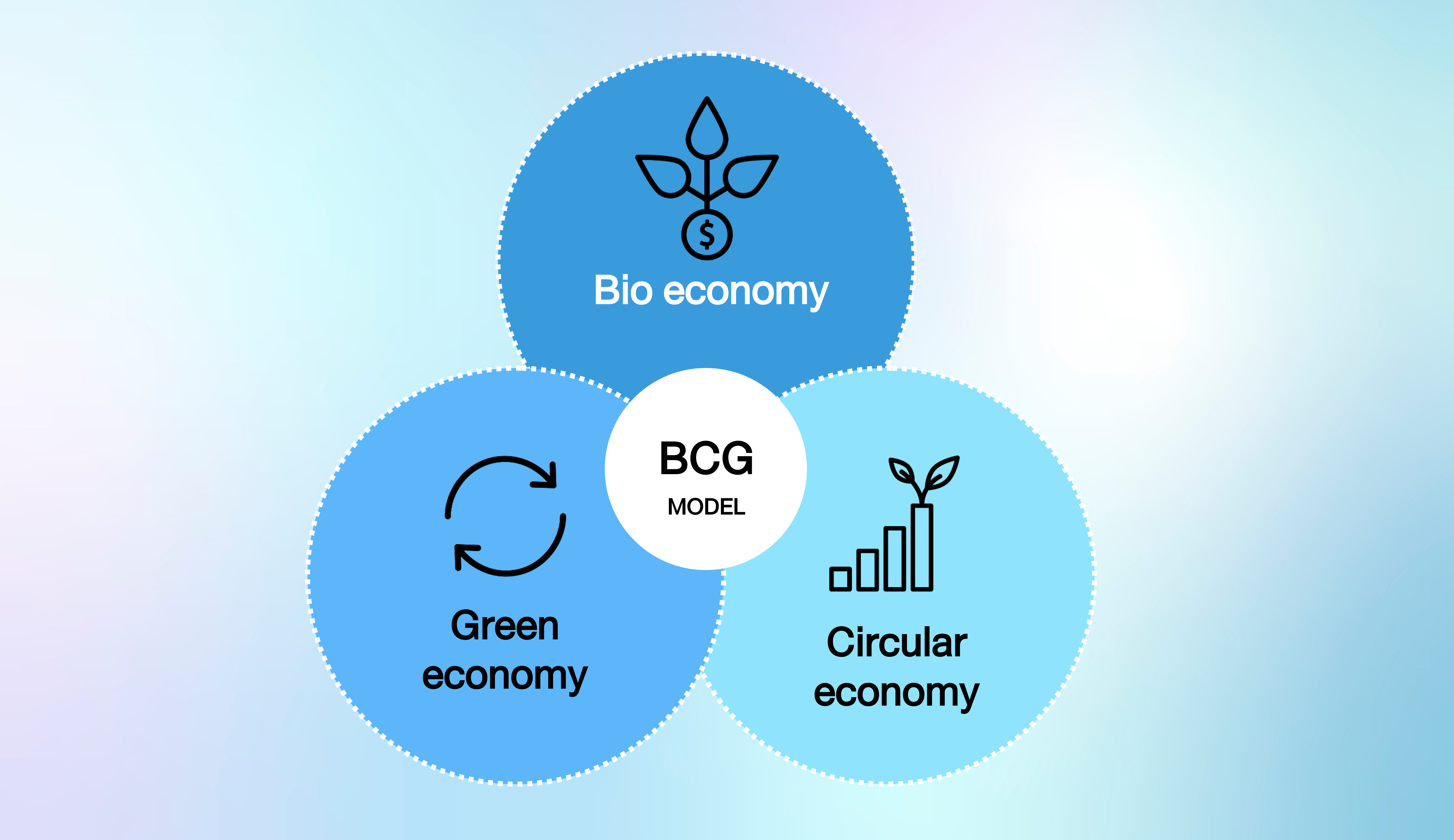
Circular Economy Strategy
OR conducts its business by adopting the principles and concepts of Circular Economy, which is the key to achieving the Sustainable Development Goals. OR integrates and applies the concept to all OR establishments to focus on resource management for the most value and reduce the use of new resources from the design process to extending the shelf life of the packaging, changing consumer behavior, reducing waste caused by the production process, as well as waste disposal after the end of its service life.
The strategy begins with identifying the potential wastes that may be produced in each business. This is to study the possibility of maximizing the benefit of waste use. Every business involved in generating such waste must establish a project implementation plan, outlining the type of waste, methods for waste reduction, and the expected reduction amount based on the specified methods and time frame.
OR has integrated the principles of the Circular Economy across all its establishments, allowing each business to adapt and apply them according to its specific operations. This is achieved through the 3R Waste Strategy, which drives the commitment to effective waste management, including:
- Reduce (New Resource Extraction): Reducing the use of natural resources by:
- Designing to minimize raw material usage
- Using raw materials with recycled materials
- Using biodegradable materials to promote sustainable use of natural resources
- Refine (Process and Product to Minimize Waste):
- Improving efficiency of production processes to reduce waste
- Designing for 100% recyclability, such as single-layer packaging
- Reborn (Waste to Value):
- Enhancing the efficiency of waste collection from business operations
- Expanding efforts to transform business waste into value through the Circular Economy concept
- Reduce (New Resource Extraction): Reducing the use of natural resources by:
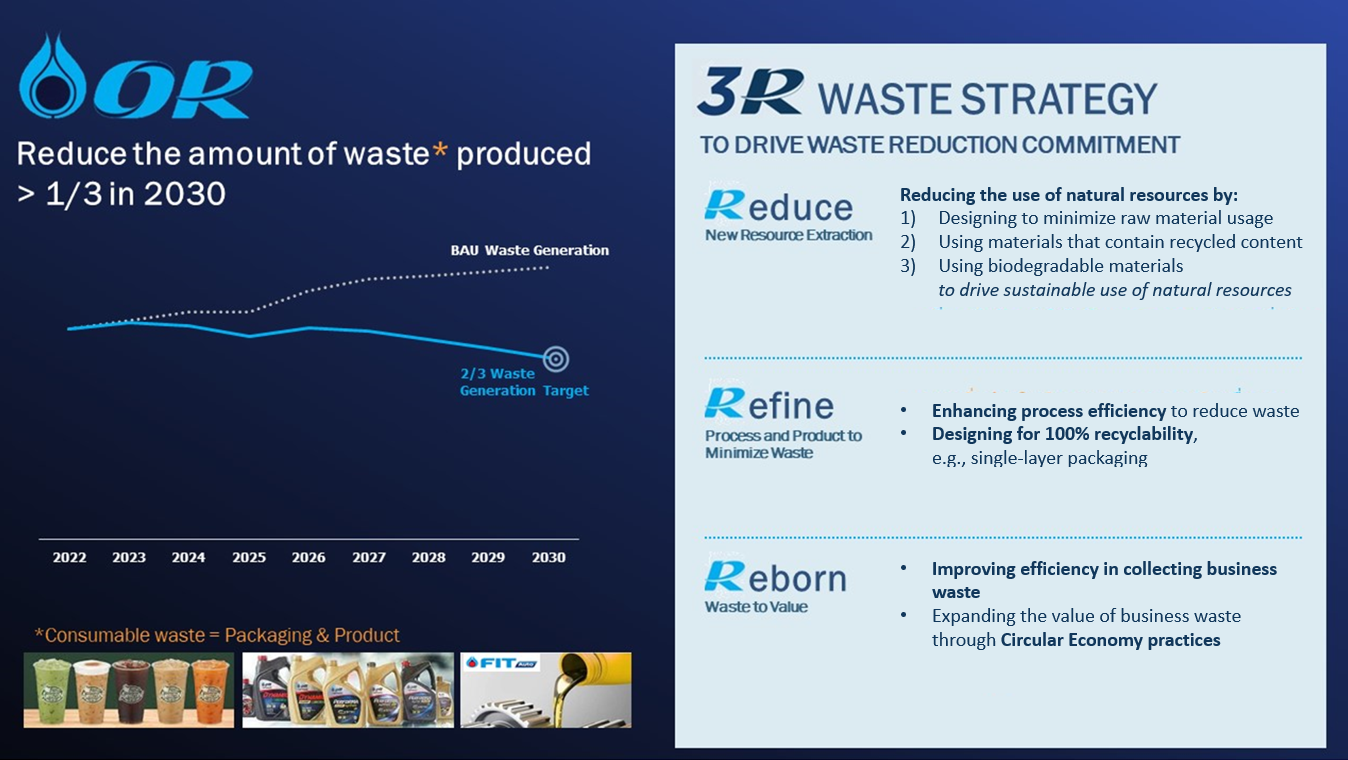
The expansion of efforts to turn business waste into value through the Circular Economy concept is driven by the Circular Economy Taskforce. The taskforce is responsible for driving and following up on progress, problems, obstacles, and evaluating the performance of related departments against the established project implementation plans. It also considers solutions or preventive measures when performance does not meet the established goals. Additionally, the taskforce provides advice and promotes the continuous improvement of operations. The results of these operations are monitored by the Sustainable Development Committee. Furthermore, the results will be reported to the Quality, Safety, Health, and Environment Management Committee (OR QSHE GMC) on a quarterly basis.
Circular economy operations will be presented through the Company’s media and public relations channels, including Facebook, the Company publication, television advertising media, OR’s website, etc.
Promoting knowledge and understanding of personnel regarding the circular economy
In addition to pushing for circular economy projects to become a reality in business operations in 2024, OR also promotes personnel to understand the circular economy concept through the ‘CE Challenge 2024’ project. This project was designed to discover ideas and concepts for waste management within the organization by applying circular economy principles to business operations. Over 91 participants showed interest in the project, and 36 individuals were selected for the Boost Comp training. This led to the creation of waste management ideas that not only helped reduce waste in OR’s business processes but also inspired new initiatives, as well as contributed to achieving the OR 2030 Goals, particularly in the area of Healthy Environment.
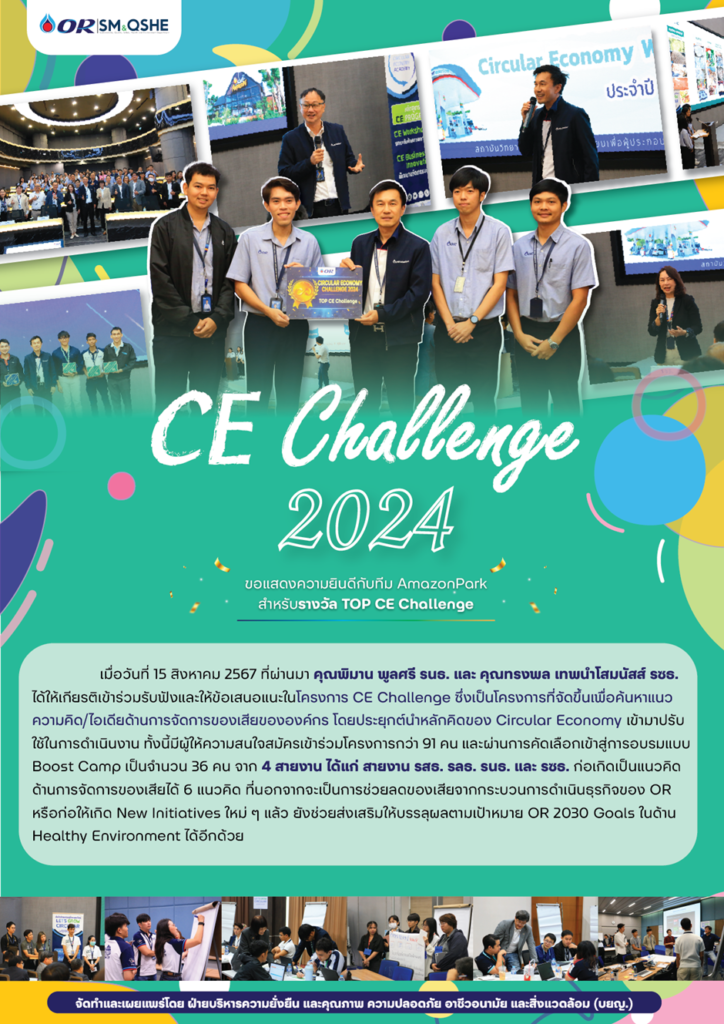
External Collaboration Projects
OR has integrated business cooperation and sustainable development with external parties by using OR’s potential to build strength and continue creating business value added. Previously, OR and GC (PTT Global Chemical Public Company Limited) signed an MOU covering cooperation in 4 areas, including the development of knowledge in sustainability, creating energy security, sustainable business operations throughout the value chain, and business development because OR believes in the concepts of “Creating Opportunities” and “Empowering All towards Inclusive Growth”. Therefore, creating networks with external parties will strengthen sustainable business operations. Examples of projects related to the circular economy created in collaboration with GC include a scope expansion for waste management and creating closed-loop recycling. The recyclable packaging such as plastic bottles, paper, glass bottles, aluminum cans, etc., was collected through GC’s Project named “You Turn Platform” and the “Yak Lak Yim” project by OR’s PTT Station. There is also the “Yak Lak Turn” Project, where customers can bring plastic that they have ‘sorted (Yak)’ to ‘exchange (Lak)’ for rewards at PTT Station. New life is given to these plastic bottles through the Recycle & Upcycle process correctly, ‘turning’ them into new beneficial products. This helps reduce plastic waste problems and greenhouse gas emissions.

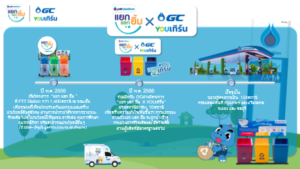
OR has initiatives to implement the concept of the circular economy which can be seen through Café Amazon, a Thai coffee brand that has been supporting Thai people for 22 years. Currently, Café Amazon operates more than 4,462 branches in the global market and 4,430 branches in Thailand. Café Amazon adheres to the principle of operating a business that strives to develop society’s economy together with caring for the community and the environment.
OR has continuously implemented waste reduction activities, from reducing the amount of plastic used in product sales, using waste from production and consumption to create new products through upcycling, and expanding the utilization of such materials to B2C (Business to Customer) and B2B (Business to Business) franchise customers to raise awareness of environmentally friendly production and consumption processes. Furthermore, OR has adapted by using biodegradable supplies within its stores to reduce environmental burdens and impacts throughout each business in OR value chain.
Performance
Packaging and Plastic Management
OR’s businesses involve with many types of plastic packaging. Improper management of such packaging may cause negative environmental impacts. Therefore, OR has pushed for various projects to reduce plastic packaging from its business operations and to seek opportunities to use environmentally friendly packaging.
1. Designing packaging with environmentally friendly raw materials by promoting Café Amazon’s use of biodegradable or reusable materials that add value, such as Café Amazon Bio Cups (PBS-coated paper cups for hot drinks), one of the eco-friendly innovations from PTT Group, and biodegradable straws, which are 100% biodegradable. Additionally, paper bags have been used instead of plastic bags in Café Amazon. Furthermore, rPET (Recycled PET) cups are now used in some branches. These efforts collectively help reduce approximately 2,339 tons.
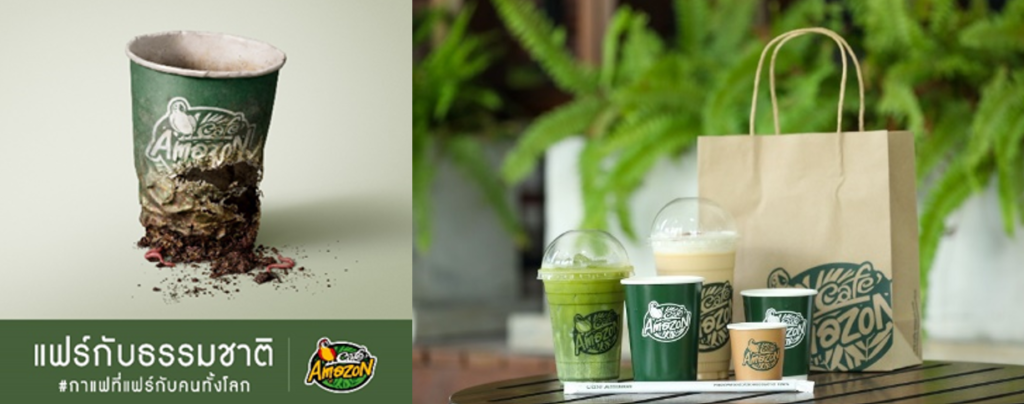
2. The Café Amazon Go Green project aims to maximize the benefits of natural resource utilization and promote sustainable use of natural resources while preserving the environment. This approach aligns with the business operations under the BCG (Bio-Circular-Green Economy) model, with operating results as follows:
- Employee shirts and aprons for baristas at all Café Amazon branches are made from upcycled materials from used PET plastic cups and bottles. The used PET plastic will be broken down into small pieces and sent to heating process at the high temperature of around 180-220 degrees Celsius to melt the plastic. It is then extracted into recycled fibres using a plastic extruder and sent to a textile factory to design a weaving pattern to be woven into fabric and sewn into products.

- Every Café Amazon branch uses decorative materials and furniture that are environmentally friendly according to BCG (Bio Circular Green) principles Model to contribute to the goal of Circular Economy for every stores.
- The Café Amazon Concept Store at PTT Station Wangchan is designed using sustainable materials. The store prioritizes materials that have minimal environmental impact during production and can be reused or transformed into functional materials again. Additionally, the use of materials that are easy to maintain and free from toxic substances is emphasized. Sustainable plantation wood and recycled materials are incorporated, such as Terrazzo flooring made from glass bottle fragments, mosaic walls from natural material scraps, recycled cement plant pots, sofa upholstery from PET bottles, decorative “C” materials from Plasscoff, and stainless steel for the counter area.

- Upcycled products made from PET plastic bottles and glass are being developed for sale in Café Amazon
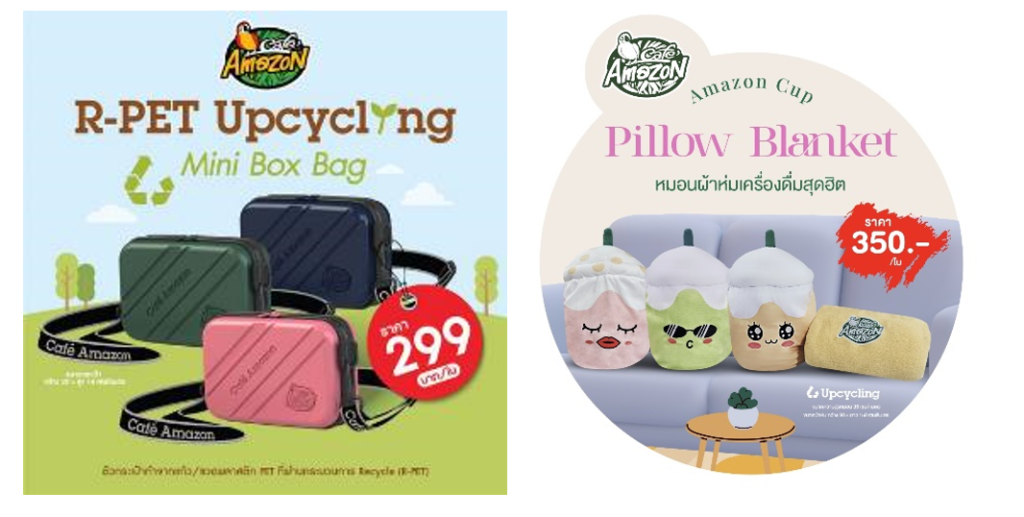
3. Changing consumer behavior is encouraged to reduce the use of resources and packaging, such as promoting the use of fabric bags and offering discounts for customers who bring their personal cups to use at Café Amazon, etc. In 2024, the use of plastic cups was reduced by 557.26 tons.

4. The “Amazon up Return” project, which accepts used Café Amazon PET plastic cups from customers, aims to reduce plastic waste and encourage consumers to adopt responsible plastic waste management practices. Consumers can return cleaned and used Café Amazon PET plastic cups or lids to designated ” Amazon up Return ” stations at Café Amazon stores. Participants are rewarded with loyalty points through Machine Learning and AI technologies, discounts, and various exclusive benefits through the project’s official LINE account (@amazoncupback). All collected plastic cups undergo recycling processes, maximizing resource utilization. This initiative promotes Café Amazon’s tangible commitment to Post-Consumer Waste Management through collaborative efforts between the brand and its consumers. Since its pilot launch in Bangkok, the project has attracted over 28,000 participants and successfully collected more than 320,000 plastic cups. By 2024, the ” Amazon up Return” project is set to expand nationwide.
Additionally, the “Amazon up Return” Project has undergone a circular economy maturity assessment based on the internationally recognized British Standard BS8001:2017. In its initial evaluation phase, the project received a score of 2.995, placing it at Level 2. Key highlights of the project include:
- Commitment to the Circular Economy: A well-defined policy framework aligned with sustainability goals.
- Customer Engagement: The use of AI technology for data collection, along with rewards to effectively encourage participation.
- Innovative Practices: This project present a creative approach to waste management and resource efficiency, integrated into OR’s business strategy.
- Transparency: Clear and accessible information ensures stakeholders remain informed about resource utilization and sustainability efforts.
The project’s implementation and results contribute to promoting sustainability while demonstrating OR’s strong commitment to conducting business responsibly, as well as, integrating environmental stewardship in collaboration with Café Amazon’s customer.


6. The “Yak Lak Yim” Project, with the purpose of campaigning for proper waste separation in PTT Stations and creating benefits for society, takes recycled waste and turns them into scholarships, consumer tools, and public utilities in various communities. The project has been implemented continuously since 2016. Between 2023-2024, there has been a collaboration with “GC You Turn” to collect recycled waste into a standard recycling plant. This create confidence for customers, who separate recycled waste through the “Yak Lak Yim” bin in PTT Stations, that the recycled waste will be appropriately recycled by the qualified recycling plant. In 2024, a total of 124 PTT Station participated in the project, successfully channeling 67.9 tons of waste into recycling processes, generating a value of over 240,000 baht.
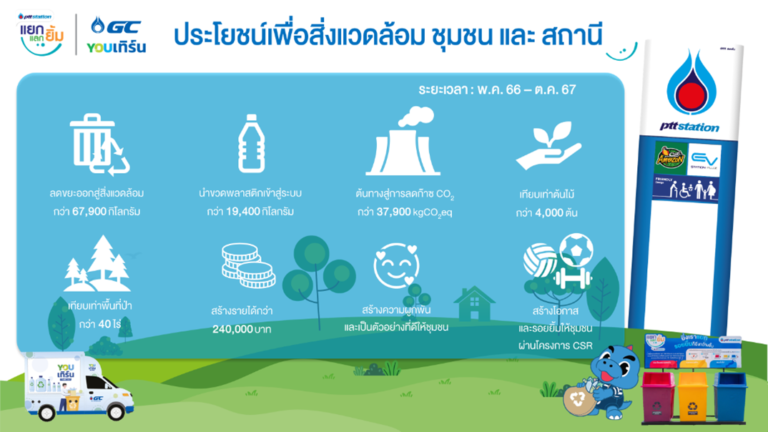
7. The used lubricant gallons from PTT Lubricants, collected from oil changes at all FIT Auto service centers nationwide, are upcycled to produce wood plastic composite (WPC) furniture by combining them with other recycled materials and biomaterials. This furniture is used to decorate the interior of the sales rooms at FIT Auto service centers. In 2024, 70.25 tons of used lubricant cans were collected from every FIT Auto branch nationwide, resulting in wood plastic composite furniture made from recycled plastic sufficient to furnish 9 branches of FIT Auto centers.

In 2024, the operation to upcycle lubricant gallons for producing wood plastic composite furniture was expanded through the “Save the World, Save the Car for Future Generations” project. The upcycled materials were used to create durable and strong student desks and chairs, which were then donated to schools in underserved areas. The first pilot project took place at Ban Pha Nang School, Mae Chaem District, Chiang Mai Province. Currently, a total of 100 student desk sets have been produced, amounting to 1.2 tons of recycled plastic.
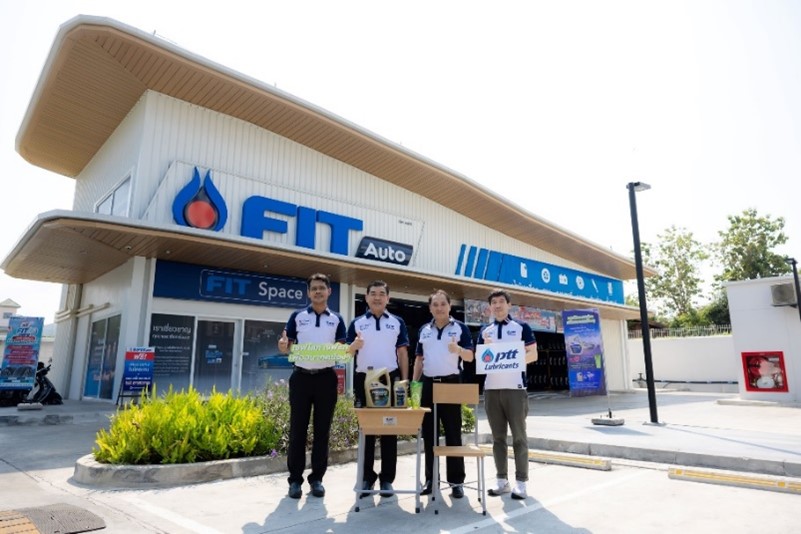
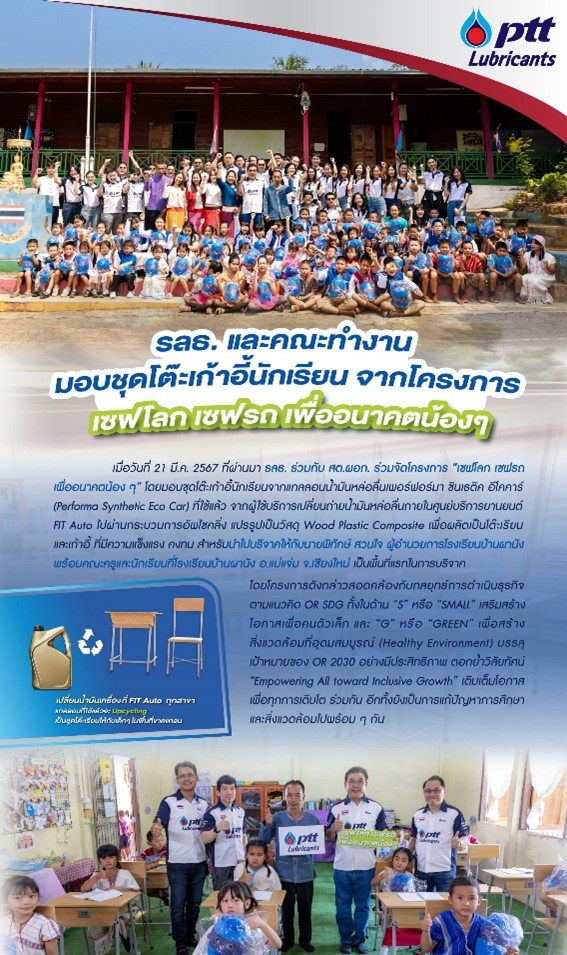
8. The lubricant business has established guidelines for purchasing environmentally friendly packaging. The proportion of recycled materials used for the middle layer of an 18-liter lubricant packaging is determined by not less than 30% without affecting the quality of the packaging.
9. The promotion of environmental initiatives within PTT Station includes the selection of recycled materials based on the principles of Circular Economy. These materials are upcycled into various upcycling products for use within PTT Station. In 2024, the following products were selected for use:
- PTT Station employee shirts, upcycled from recycled PET plastic bottles, are a new product where OR has chosen to use recycled materials in the production process. These shirts are used within OR’s PTT Station (COCO) and sold to franchise (DODO) who place orders for employee uniforms starting from 2024. Currently, over 24,000 shirts have been adopted.
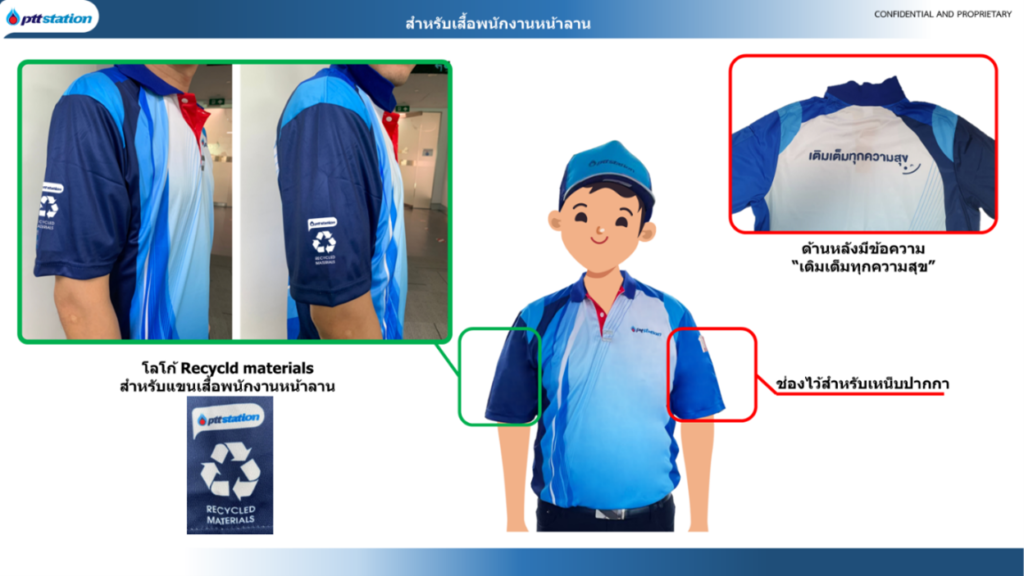
- The use of benches made from recycled PE (Polyethylene) plastic within PTT Stations. In 2024, a total of 42 benches were placed at 17 stations to test their lifespan and various characteristics, with the aim of further development for future sales.
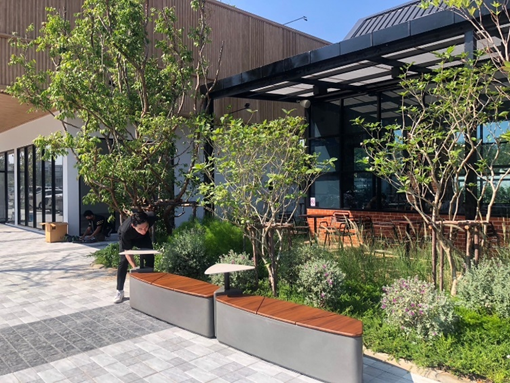
Food Loss and Food Waste
Food loss and food waste is a challenging problem for retail businesses. Thus, OR aims to operate its businesses in a way that promotes the most efficient use of natural resources. OR is committed to reduce food loss and waste measurement by reviewing the production processes and waste reduction in every related OR business. Moreover, OR formulates a strategy to use resource efficiently, through alternative uses for food waste and raising awareness among employees and stakeholders along the OR value chain. OR has collected data on the amount of food loss that occurs within the related businesses, including Café Amazon Roastery Plant, Bakery Factory, and Dry Mix Factory to monitor the performance and set a suitable plan to reduce the amount of food loss in the future.
Projects
- The Food Loss to Fertilizer Project collects food loss from the production process of the Café Amazon business, such as coffee chaff from the Café Amazon Roastery Plant. In 2024, the Food Loss, which is the coffee chaff, were used to produce the soil amendment materials.
In addition, a study has been conducted on the use of parchment coffee husk, a waste product from the coffee bean processing in Chiang Mai province. The study explores various ways to utilize the husk, such as analyzing its composition, investigating its potential as a soil amendment material for plant cultivation, and exploring its use in the production of biochar.
- The Lean Six/Sigma project focuses on finding ways to reduce or eliminate unnecessary activities or those that do not add value, with an emphasis on reducing uncertainty and ensuring stable operations with minimal variation. The project was implemented at the Dry Mix plant, and the results led to more accurate final product release processes. This resulted in a reduction in the amount of waste generated from packaging during the process.
- The “Pun Suk Oil” project expands the collection of used cooking oil to communities around PTT Station gas stations and LPG Cylinder business customers, such as gas filling stores. The aim is to serve as collection points for used cooking oil from the community, which is then processed and refined into various types of biodiesel. This also supports the secure feedstock supply of UCOME for the production of alternative fuel oil for OR’s future marine and aviation fuel businesses. In addition to benefiting OR’s business, the project helps reduce environmental impacts by preventing pipe blockages caused by the disposal of oil down drains and promotes proper waste management in collaboration with local communities. The activities began from September to November 2024, with over 2,100 kilograms of used cooking oil collected from the community.
- The Food Loss to Fertilizer Project collects food loss from the production process of the Café Amazon business, such as coffee chaff from the Café Amazon Roastery Plant. In 2024, the Food Loss, which is the coffee chaff, were used to produce the soil amendment materials.

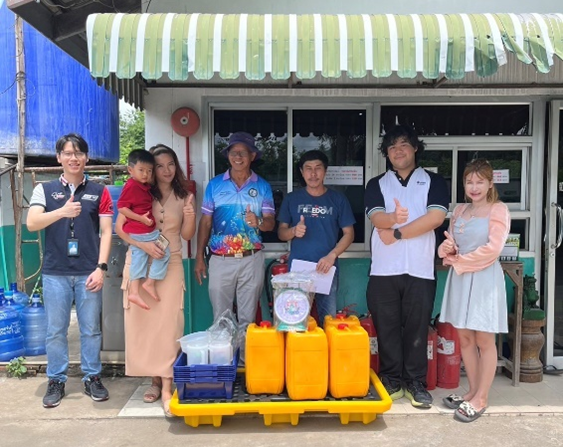
Product waste management
Managing product waste for maximum utilization is one of OR’s commitments to reduce the amount of waste generated from the Company’s business operations. Related projects include:
- The Used Lube to Alternative Fuel Oil Project collects used lubricants from every FIT Auto automotive service center to be reused to produce alternative fuel oil to benefit industrial customers. In 2024, OR collected 1.22 million liters of used lubricants.
- The SCG MODEENA COFF decorative wall features up to 48% of coffee chaff from Café Amazon as part of the total material composition. This is the result of a collaboration between Café Amazon and SCG in developing materials aligned with the principles of Circular Economy and Waste Utilization. The wall comes in two colors: Espresso and White Mocha, with a surface that reveals tiny coffee ground particles, creating a unique texture that reflects nature and sustainability.

Prototype station model for Circular Economy operations
PTT Station Flagship Vibhavadi 62 branch is a prototype station model for Circular Economy operations, which has efficient waste management at the source by promoting the waste separation and correctly sending waste to recycling process as follows:
- Food waste from various shops and restaurants are separated and transformed through a food waste shredder into soil amendment materials for further utilization in the PTT Station.
- Recyclable waste separation such as water bottles, cans, glass bottles, cardboard boxes, etc., from “Yak Lak Yim x GC You Turn” project is sent to certified recycling plant.
- The decorations in the Cafe Amazon Concept Store are made from environmentally friendly materials according to the Circular Economy concept and BCG Model (Bio Circular Green). There is a drop point for “Café Amazon Cup Return” Project in the Cafe Amazon Concept Store for collecting and upcycling the used PET cups.
- The collection of used lubricants from oil changes at FIT Auto service centers ensures proper recycling processes. Additionally, used lubricant cans from FIT Auto service centers are collected for upcycling. Recycled plastics and other biomaterials are utilized to produce wood-plastic composite furniture, which is used to decorate the customer lounges at FIT Auto service centers.
Site map
- About
- Organization
- Career
- Oil Business
- - Retail Energy Solution
- - Commercial Business
- Retail Business
- Services
- International Business
- Business Opportunity
- Sustainability
PTT Oil and Retail Business Public Company Limited
555/2 Energy Complex Building B, 12th Floor, Vibhavadi Rangsit Rd., Chatuchak, Bangkok 10900
© 2024 OR Tel : 02 196 5959
